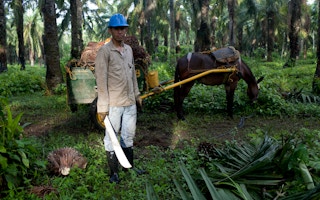Colombian oil palm company Daabon Group on Monday became the world’s company to receive the Roundtable on Sustainable Palm Oil’s (RSPO) extra-strict sustainability stamp, known as RSPO Next.
To continue reading, subscribe to Eco‑Business.
There's something for everyone. We offer a range of subscription plans.
- Access our stories and receive our Insights Weekly newsletter with the free EB Member plan.
- Unlock unlimited access to our content and archive with EB Circle.
- Publish your content with EB Premium.
RSPO Next is a voluntary, more stringent addition to the regular RSPO standards for socially and environmentally responsible palm oil, and is the highest certification that the Kuala Lumpur-headquartered industry association offers.
It was developed by RSPO largely in response to criticism that the association’s certification was lagging behind policies promising zero deforestation, burning, and peat development by industry giants such as Golden Agri-Resources, Wilmar, and Cargill.
To earn RSPO Next certification, companies must meet requirements in five categories: No deforestation, no fire, no planting on peat, reduction of greenhouse gases, respect for human rights, and transparency.
And while the main certification is given to individual units of a company, RSPO Next is only for firms that demonstrate sustainability across the entire organisation. This refers to the whole company, and any investments, joint ventures, and suppliers.
Manuel Julian Dávila, chief executive officer of Daabon, said in a statement that “this achievement reconfirms Daabon’s commitment to sustainability and RSPO”.
He added: “We are especially proud to be the first group globally, together with our 122 small farmers, to show that RSPO Next certification is challenging, but doable, also for smallholders.”
Daabon, which has four palm oil estates in Northern Colombia spanning almost 10,000 hectares, has had all of its palm oil certified according to RSPO’s baseline requirements since 2010.
Its palm oil is certified as “identity preserved”, which is the most stringent RSPO certification possible. This means that sustainably grown palm oil from a single plantation is kept physically separate during the transport and refining process.
“
The fact that standards continue to be raised sends a strong signal to other companies that getting certified is becoming an industry standard, not an option.
Grégory Bardiès, market transformation manager, WWF Singapore
In January 2017, the company hired independent auditors to review operations on its estates and that of the 122 smallholder farms that supply the company, to check whether it complies with RSPO Next requirements.
Now that the company has passed the audits and attained the certification, it can generate RSPO Next credits and sell them on a web platform hosted by RSPO. Palm oil buyers that want to claim their commitment to RSPO Next can buy these credits, since there is no physical supply chain for the accreditation.
RSPO chief executive officer Darrel Darrel Webber congratulated Daabon, and added that the achievement “is a demonstration of the great momentum we are seeing from RSPO members in the Latin American palm oil market, where output of certified sustainable palm oil is growing.”
Industry observers welcomed the move as a new milestone for the sector. Grégory Bardiès, market transformation manager, WWF Singapore, told Eco-Business that the RSPO Next certification is a “more robust standard that applies not just to a company’s operations, but their practices on the ground too”.
Daabon’s certification “provides an indication of where standards are heading in the longer term”, said Bardiès.
The sustainable palm oil movement is already gaining momentum in Asia as more firms pursue RSPO certification, he added. “The fact that standards continue to be raised sends a strong signal to other companies that getting certified is becoming an industry standard, not an option.”








